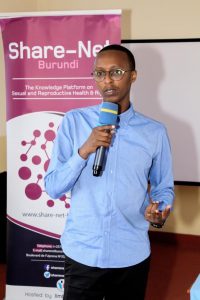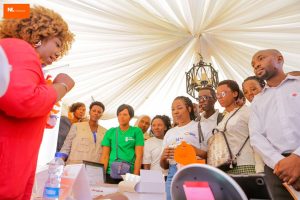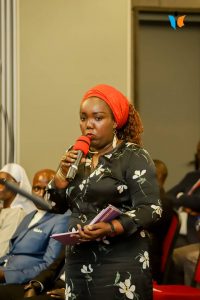Share-Net Burundi Spring Update 2022
In May, Share-Net Burundi organised a live instagram debate for Menstrual Hygiene day. The aim was to demystify menstrual health, which is a still a taboo SRHR topic in Burundian culture and society, and to aid the existing conversation on Period Poverty that affects the majority of Burundian Women and girls. More than 2,000 people participated in the debate, including activits, public figures, and Miss Burundi 2022 Kelly Ngaruko, who is a great advocate for the rights and empowerment of Burundian women.

As part of promoting the role of youth in SRHR research as a driver of safe information dissemination, Share-Net Burundi organises exchanges with students, faculty, health professionals and policy makers to foster debate around the link between research, policy and practice in SRHR programs. This year the first exchange in June was organised with Medical students with the theme “research and innovation in health programs to accelerate universal health coverage” at the University of Ngozi. The discussion was led by a member of MSFC, with two speakers from the medical field and TIC respectively. One of the presentations aimed at debunking factors of vulnerability, especially among the youth and the lack of quality information, while the other was based on what the TIC industry can contribute on advancing universal health coverage in general and SRHR in particular. The exchange saw the participation of over 50 students across several faculties.

The AYSRHR Community of Practice agreed in June to analyse the status of unwanted pregnancies in schools and at the community level, as well as identifying priorities, proposing solutions for improvement to address the challenges, and to disseminate Knowledge products developed by members. MSFC to present the results of the study conducted on the Assessment of the impact of flooding on sexual and reproductive health in the Gatumba area. After the explanation of the socio-ecological model, two focus groups were formed that are currently co-creating collaborative solutions applicable to SHIRIM in Burundi. The first will work on CSE and the second on engaging civil society and religious denominations to improve the access for young people to appropriate, “consumable” and authentic information on sexuality in Burundi.
In June, the European Union together with the Ministry of Foreign Affairs of Burundi celebrated their longstanding collaboration, with an event titled Journee de la cooperation EU-Burundi. It was an opportunity for Share-Net

Burundi, under the flagship of the Netherlands Embassy, to showcase their work with the public the work, particularly the disseminating quality information on SRHR, and the services that are offered by their local partners.
Lastly, there was an exchange-debate under the high patronage of Burundian first lady, with the theme All together to break the taboos in favor of the good management of menstrual hygiene. Share-Net Burundi participated in this exchange in the person of Ines Kidasharira, the Coordinator of the Program SRHR Solutions of the Embassy of the Kingdom of the Netherlands. One of the messages from Share-Net Burundi was to see the dialogue around SSRAJ issues expanded, removing tax from the sale of sanitary pads, and to reintroduce sewing lessons in schools so that students can develop skills to produce their own reusable sanitary pads. Read more here.
